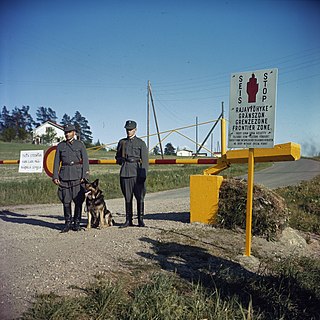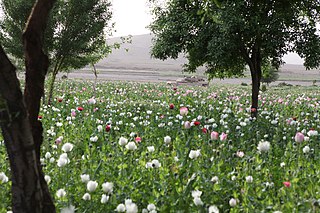Related Research Articles

Tajikistan, officially the Republic of Tajikistan, is a landlocked country in Central Asia. Dushanbe is the capital and most populous city. Tajikistan is bordered by Afghanistan to the south, Uzbekistan to the west, Kyrgyzstan to the north, and China to the east. It is separated from Pakistan by Afghanistan's Wakhan Corridor.

The illegal drug trade, drug trafficking, or narcotrafficking is a global black market dedicated to the cultivation, manufacture, distribution and sale of prohibited drugs. Most jurisdictions prohibit trade, except under license, of many types of drugs through the use of drug prohibition laws. The think tank Global Financial Integrity's Transnational Crime and the Developing World report estimates the size of the global illicit drug market between US$426 and US$652 billion in 2014 alone. With a world GDP of US$78 trillion in the same year, the illegal drug trade may be estimated as nearly 1% of total global trade. Consumption of illegal drugs is widespread globally, and it remains very difficult for local authorities to reduce the rates of drug consumption.

A border guard of a country is a national security agency that performs border security. Some of the national border guard agencies also perform coast guard and rescue service duties.

The United States Central Intelligence Agency (CIA) has been accused of involvement in the trafficking of illicit drugs. Books and journalistic investigations on the subject that have received general notice include works by the historian Alfred McCoy, professor and diplomat Peter Dale Scott, journalists Gary Webb and Alexander Cockburn, and writer Larry Collins. These claims have led to investigations by the United States government, including hearings and reports by the United States House of Representatives, Senate, Department of Justice, and the CIA's Inspector General. The various investigations have generally not led to clear conclusions that the CIA itself has directly conducted drug trafficking operations, although there may have been instances of indirect complicity in the activities of others.

Afghanistan has long had a history of opium poppy cultivation and harvest. As of 2021, Afghanistan's harvest produces more than 90% of illicit heroin globally, and more than 95% of the European supply. More land is used for opium in Afghanistan than is used for coca cultivation in Latin America. The country has been the world's leading illicit drug producer since 2001. In 2007, 93% of the non-pharmaceutical-grade opiates on the world market originated in Afghanistan. By 2019 Afghanistan still produced about 84% of the world market. This amounts to an export value of about US $4 billion, with a quarter being earned by opium farmers and the rest going to district officials, insurgents, warlords, and drug traffickers. In the seven years (1994–2000) prior to a Taliban opium ban, the Afghan farmers' share of gross income from opium was divided among 200,000 families.

Transnational organized crime (TOC) is organized crime coordinated across national borders, involving groups or markets of individuals working in more than one country to plan and execute illegal business ventures. In order to achieve their goals, these criminal groups use systematic violence and corruption. Common transnational organized crimes include conveying drugs, conveying arms, trafficking for sex, toxic waste disposal, materials theft and poaching.

The Anti-Narcotics Force is a federal executive bureau and a paramilitary force of the Government of Pakistan, tasked with combating the narcotics smuggling and use within Pakistan. ANF works under the umbrella of Pakistan Army and Ministry of Narcotics Control (Pakistan) of which Mohsin Raza Naqvi is the minister since March 2024. Due to misconception on Section 4 of ANF ACT 1997, the force's head consisted of the active-duty general officer of Pakistan Army. Although the law prescribes that any competent person may be appointed as Director-General. Currently, a two-star Army Officer, Major general Muhammad Aniq Ur Rehman Malik is deputed as Director-General. The ANF also has sole responsibility for coordinating and pursuing Pakistan narcotics investigations abroad.
The illegal drug trade in China is influenced by factors such as history, location, size, population, and current economic conditions. China has one-sixth of the world's population and a large and expanding economy. China's large land mass, close proximity to the Golden Triangle, Golden Crescent, and numerous coastal cities with large and modern port facilities make it an attractive transit center for drug traffickers. Opium has played an important role in the country's history since before the First and Second Opium Wars in the mid-19th century.
This article deals with activities of the U.S. Central Intelligence Agency related to transnational crime, including the illicit drug trade.

Crime in Afghanistan is present in various forms, and includes the following: corruption, contract killings or assassinations, bombings, kidnapping, drug trafficking, money laundering, black marketeering, and ordinary crimes such as theft and assault.

Crime in Russia refers to the multivalent issues of organized crime, extensive political and police corruption, and all aspects of criminality at play in Russia. Violent crime in Siberia is much more apparent than in Western Russia.

Mohammed Daud Daud, also known as General Daud Daud, an ethnic Tajik, was the police chief in northern Afghanistan and the commander of the 303 Pamir Corps. He was an opponent of the Afghan Taliban.

The Narcotics Control Bureau is an Indian central law enforcement and intelligence agency under the Ministry of Home Affairs, Government of India. The agency is tasked with combating drug trafficking and the use of illegal substances under the provisions of Narcotic Drugs and Psychotropic Substances Act.
The CARICC is a Central Asian anti-drug trafficking organization.

The Six plus Two Group on Afghanistan describes an informal coalition of the six nations bordering with Afghanistan, plus the United States and Russia, which functioned from 1997 to 2001 under the aegis of the United Nations. The coalition worked to find a peaceful solution that would have included the participation of the Afghan Northern Alliance. Later it explored the issue of a post-Taliban government for Afghanistan.
Drug trafficking organizations are defined by the United States Department of Justice as, "complex organizations with highly defined command-and-control structures that produce, transport, and/or distribute large quantity "Law enforcement reporting indicates that Mexican DTOs maintain drug distribution networks, or supply drugs to distributors, in at least 230 U.S. cities." The use of weapons and fear are commonplace in trafficking which often lead to other crimes in the process. The structures of many of these organizations are of a para-military nature using armed combatants to protect their stock of illegal drugs from growth to delivery.
The Narcotics Control Board (NACOB) is a Ghanaian agency under the Ministry of Interior. It is the agency concerned with the formulation and enforcement of narcotics laws in the country. The board's work is aimed at preventing the use, import, and export of narcotics.

Law enforcement in Tajikistan is primarily the responsibility of the Ministry of Internal Affairs, which controls the police force, which is referred to as the militia occasionally. It is divided into multiple departments, each led by an officer, including the Tajik Internal Troops, as well as the National Guard, which takes orders directly from the President of Tajikistan. The Minister of Internal Affairs oversees it all. The Drug Control Agency is responsible for combating drug trafficking, which has been a major problem due to high heroin production in Afghanistan, to the south.
East African drug trade refers to the sale and trafficking of illegal drugs that take place in East African countries like Kenya, Tanzania, Uganda, Somalia, and Ethiopia. The most prevalent types of drugs traded in East Africa are heroin, marijuana, cocaine, methamphetamine, and khat, all of which are strictly prohibited in East African countries.
Illicit drug trafficking in the West Indian Ocean (WIO) has increasingly become a major security concern for many States in the region, and is gaining international attention. The Indian Ocean borders 24 states, and accounts for a third of the world’s ocean area. Until recently, other challenges, such as piracy off the coast of Somalia, has been at the forefront of international action. However, the utilisation of the Southern route by drug traffickers, and the consequent issues this has caused, has led to increased focus on how to tackle this issue.
References
- ↑ Shishkin, Philip (21 May 2013). Restless Valley: Revolution, Murder, and Intrigue in the Heart of Central Asia. ISBN 9780300185980.
- 1 2 Tajikistan: Drug Control Agency Draws Praise and Criticism | EurasiaNet.org
- ↑ "IRIN Asia | TAJIKISTAN: Drug control agency makes its mark | Tajikistan | Other". Archived from the original on 28 September 2011. Retrieved 8 January 2011.
- ↑ UN high official says Tajikistan is key to deter drug trafficking from Afghanistan » Breaking News | Wire Update News | News Wires Archived 27 December 2010 at the Wayback Machine
- ↑ Tajikistan is the first line of defence in stemming Afghan drugs: UNODC Executive Director
- ↑ Drug Control Agency marks milestone
- ↑ Country Report on Human Rights Practices in Tajikistan